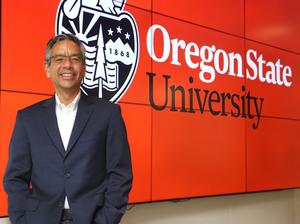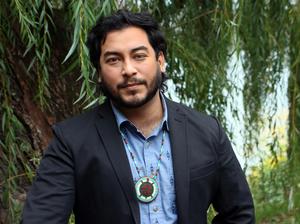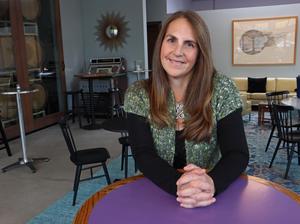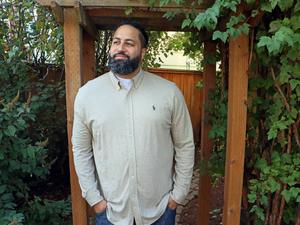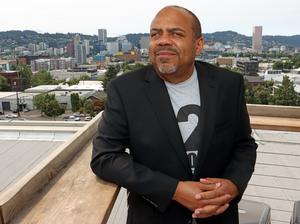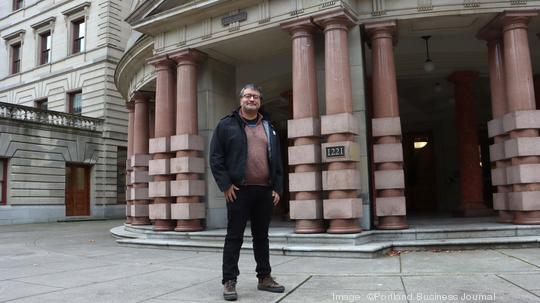
When Hector Dominguez Aguirre was working on his Ph.D. in Mexico City, he co-founded a collective called Open Workshop of Art and Technologies. The idea was to bring people with professional expertise to work in communities.
Through this work, the communities would benefit from experimental tech projects while members of the collective learned from them. One effort consisted of a sensor network project for forestry in Southern Mexico while another group worked with fish farms in the Gulf of Mexico.
Such community work, and finding ways to bridge technology and humanity, has been central to Dominguez Aguirre’s career.
“I’m always looking back and questioning why I’m doing things and how I can also contribute to my community and the people that may need a little bit of support and help,” he said.
Now, Dominguez Aguirre is using his tech expertise as the Smart Cities open data coordinator at the city of Portland. We caught up to talk about what this means. This interview has been edited for length and clarity.
What does Open Data mean for an organization like the city of Portland? Open data is a proactive way that government is actually releasing information that is being used for decision making. What’s happening in the city in terms of city operations? What is the city monitoring? It’s a tool for transparency. So open data is proactively publishing the information without having to ask for it.
What’s your role in that? Data is very dynamic in that it is changing constantly and constantly being generated. It needs internal management systems, policies, which is something we have been working on. One of the first questions that we started asking was what is really open and what is not open? Do we have a policy that we can follow?
When I joined the city in 2018, it turned out we didn’t have a clear policy for that. We started working with the Office of Equity and Human Rights on privacy issues because privacy is a human right. We were inspired by what was happening in the world of privacy at the same time (with) the General Data Protection Regulation in Europe coming into effect.
How did GDPR play into your work? GDPR had this really nice framework around privacy rights. We started pitching this idea of privacy rights, however, very quickly after talking to our city attorneys they recommended we just stay with principals because privacy rights would be a much longer journey.
That’s how we ended up having (privacy) principles (adopted by the city in 2019). We tried to drive our principles mostly from the community perspective, following the idea of privacy rights, and then what does it mean for those we are trying to serve and having that privacy respected in a way that we can show better data stewardship for what they are entrusting us to have.
What kinds of projects have you most excited about how this data can be used? We are trying to promote the idea of digital justice around technology and information where technology and information should serve fairly to everyone regardless of who you are. I’m a technologist. I love the idea of having technology helping others.
For instance, I live in East Portland not far from Lents, that area we had the main number of deaths in Portland happen during the heat dome. I’m trying to picture and figure out how technology can help those who are vulnerable. How the city, and not necessarily the city government, but neighbors could actually be able to help each other with technology when technology is suitable.
On the flip side of that, what about this work keeps you up at night? Data is definitely biased. Sometimes people say that technology is neutral and information is also neutral. However, it is not. Because it depends on how you are collecting the data, where you are asking information. You can get a lot of biases by not asking people or by over sampling or building narratives around a specific data point. Data can be manipulated. You can build anything out of a specific data piece; manipulate statistics just to support your argument. The important thing is we need to make things transparent. Where is data being sourced? Can we really trust that information? Can we really trust the conclusions that somebody is telling us? That’s one of the things that makes me (work) in open data, that I’m building transparency around processes.
Hector Dominguez Aguirre
Hometown: Xalapa, Mexico
Education: bachelor’s in electronic and communications engineering, Instituto Politécnico Nacional; master’s in mechanical engineering, Instituto Politécnico Nacional; master’s mechanical engineering, UC Berkeley; doctorate in mechanical engineering, Instituto Politécnico Nacional
Boards: Oregon Citizen’s Utility Board
Currently reading: A lot of A.I. ethics books and work by Yuk Hui; “Hidden Portland,” by Carey Bye; re-reading The Foundation series by Isaac Asimov
Last binge watch: “Seinfeld”
Go-to Portland restaurant: Wongs King, Mixteca
